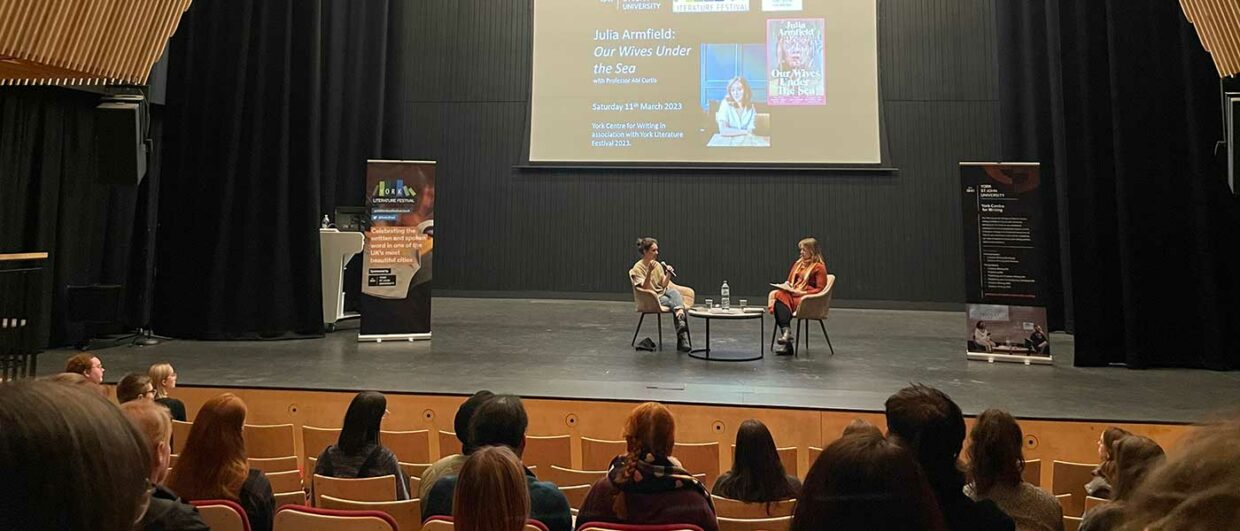11 March 2023 marked the official launch of this year’s York Literature Festival. The festival opened with acclaimed author Julia Armfield in conversation with Professor Abi Curtis, joined by an excited audience in the new Creative Centre at York St John University.
Julia, a fiction writer of the short story collection salt slow, was here to discuss her debut novel Our Wives Under the Sea, a story of falling in love, loss, grief, and what life there is in the deep, deep sea. She was longlisted for the Deborah Rogers Prize 2018 and was the winner of The White Review Short Story Prize 2018. In 2019, she was shortlisted for the Sunday Times Young Writer of the Year award. Her debut collection, salt slow, was longlisted for the Polari Prize 2020 and the Edge Hill Prize 2020 and was shortlisted for the London Magazine Prize for Debut Fiction 2020. Our Wives Under the Sea was shortlisted for the Foyles Fiction Book of the Year Award 2022.
The Sea and its Queerness
Both salt slow and Our Wives Under the Sea are very much watery texts. Indeed, Julia Armfield says it herself, her preoccupation with the sea isn’t incidental. No, she uses the sea ‘as a way of symbolising the very specific affirmation of queerness’. She mentions how salt slow was for her ‘a coming out book’ and how much, in her writing, she has always been interested from a queer perspective.
Approaching her debut novel, in which the narrative is split between two characters, one stuck in the surface world, the other stuck in a submarine, Julia explores the development of a crisis in a relationship. Not only is it a novel about grief and the anticipation of grief, but it is also a novel about change, and how much we can grieve for ourselves because of it.
Her slight link to greek myths when it comes to the sea and her desire to show non human transformation as a feminine experience slowly brings to life ‘the implicit queerness of the monster’ in Our Wives Under the Sea. Julia describes this choice of genre by saying she finds horror both romantic and beautiful, even referencing the famous quote from Donna Tartt’s The Secret History: ‘Beauty is terror. Whatever we call beautiful, we quiver before it.’
‘Horror as a feeling is the anticipation,’ Julia tells the audience, explaining why she didn’t want the reader to see the monster even though the main character sees it.
Julia’s Writing Process
After that, Julia goes on to describe her writing process, at first ‘very imitative’. It all came together for her when she discovered writing was about having something to say, which helped her become more aware of her queerness.
The audience is enraptured when Professor Abi Curtis asks her about her scientific research. ‘I spent a lot of time in Wikipedia,’ Julia jokes, before explaining she’s doing just enough research so that the novel is not ‘so off that it’s annoying for the reader.’ More than that doesn’t seem necessary to her, as she doesn’t want to tell us anymore than she needs to.
This brings the unavoidable debate of short versus long writing. Julia shares with the audience that she finds the process of writing a whole novel harder, as there is ‘a lot of pressure that isn’t in short fiction’, hinting at having to build an entire world whilst nothing can be left in the margins. This, she says, she faced by ‘daring herself to bore herself by following a thought,’ it didn’t necessarily serve the plot, but it opened the novel up for her. Good advice for young writers stuck in short stories and wanting to expand their writing.
Her publishing experience and life as an author
The event finishes with twenty minutes of questions from the audience. When asked about her publishing experience when wanting to publish salt slow, Julia mentions how publishers required a whole novel too. She put up a pitch together (on a short train ride!) and that’s how she managed to get a contract.
After that, her first novel, when finally finished, was refused. She quickly reassures the audience and its hopeful writers not to despair, saying ‘everybody needs a failed novel to figure out their writing’. She finishes by advising to not get rid of any of your writing. Indeed, she concludes, ‘Not all writing is good, but all writing is valuable’.
Clara Juncker
Clara Juncker is a French writer currently living in Sheffield. She is studying a master’s in Publishing and Creative Writing after doing an undergraduate degree in Modern Applied Languages in Strasbourg, her hometown. Her first short story will soon be published in an anthology by Whimsical Press and she’s hoping to publish her debut novel in the next five years.
Photo by Clara Juncker

